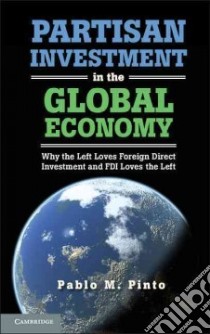- Libreria
- >
- Libri in lingua
- >
- Economia, finanza e management
- >
- Economia politica
Partisan Investment in the Global Economy - 9781107617360
Un libro in lingua di Pinto Pablo M. edito da Cambridge Univ Pr, 2013
- € 27.50
- Il prezzo è variabile in funzione del cambio della valuta d’origine
"The territorial state which dominated the industrial era is increasingly becoming obsolete, and is gradually being replaced by new forms of global governance (Ohmae, 1995; Strange, 1996, 1998; Rosecrance, 1999). Moreover, the pressure from global markets have blurred the ideological differences among political parties not only among developed countries, but particularly in the developing world: to stay competitive in the global marketplace governments of the left and the right alike have become fanatical advocates of the neo-liberal cause (see, among others, Edwards (1995); Williamson (1990); Garrett (2000)). The conclusion is that when dealing with global market forces politics does not matter any more, if it ever did. On the opposing side of the debate we find claims that the incentives and constraints created by global economic forces lead to policy divergence rather than convergence (Tiebout, 1956; Vogel, 1996; Berger and Dore, 1996; Kahler, 1998; Kahler and Lake, 2003). The patterns of divergence are systematic: they depend as much on the preferences of the actors as they react to the constraints and opportunities created by global forces (Cameron, 1978; Rodrik, 1997). Scholars ascribing to this tradition argue that governments have ample room to maneuver, and make policy choices that are a clear reflection of their types (Swank, 1998; Hall and Soskice, 2001; Garrett and Mitchell, 2001; Swank and Steinmo, 2002). The heated debate on the consequences of globalization, present in politics, journalismand academia, is far from settled. Changes in global production spearheaded by multinational corporations are a central characteristic of the current era of globalization (Bordo et al., 1999)"--
Informazioni bibliografiche
- Titolo del Libro in lingua: Partisan Investment in the Global Economy
- Lingua: English
- Autore: Pinto Pablo M.
- Editore: Cambridge Univ Pr
- Data di Pubblicazione: 31 Marzo '13
- Genere: BUSINESS and ECONOMICS
- EAN-13: 9781107617360


